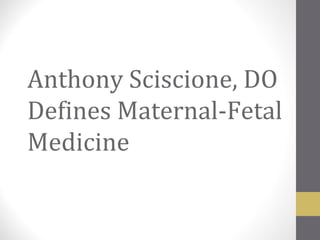Anthony Sciscione, do defines maternal fetal medicine
- 1. Anthony Sciscione, DO Defines Maternal-Fetal Medicine
- 2. Anthony Sciscione, DO Defines Maternal-Fetal Medicine ŌĆó Maternal-fetal medicine, also known as perinatology, is a branch of obstetrics which deals with the management of high-risk pregnancies. A variety of factors can contribute to a pregnancy being deemed high-risk. Chronic illness, conditions such as hypertension or diabetes, previous miscarriages, advanced maternal age, and other medical, surgical, or obstetric issues can all produce complications during pregnancy, and therefore require specialized monitoring and care.
- 3. Anthony Sciscione, DO Defines Maternal-Fetal Medicine ŌĆó Specialists in this quickly evolving area of medicine are obstetrician-gynecologists who have undergone two or three supplementary years of formal education, including clinical experience, and are certified by the American Board of Obstetrics and Gynecology. This additional training equips medical practitioners with expertise in diagnosing and treating pregnancy complications, as well as in the management of both a pregnancyŌĆÖs impact on pre-existing medical conditions and the effect these conditions can have on the pregnancy itself.
- 4. Anthony Sciscione, DO Defines Maternal-Fetal Medicine ŌĆó About the Author: Anthony Sciscione, DO is Director of the Delaware Center for Maternal and Fetal Medicine as well as the Obstetrics and Gynecology Residency Program at Christina Hospital in Newark, Delaware. He received his Bachelor of Science degree from St. JosephŌĆÖs University before attending the University of New England College of Osteopathic Medicine in Biddeford, Maine. In 2010, Anthony Sciscione, DO was named a Top Doctor of 2010 by Delaware Today Magazine.




